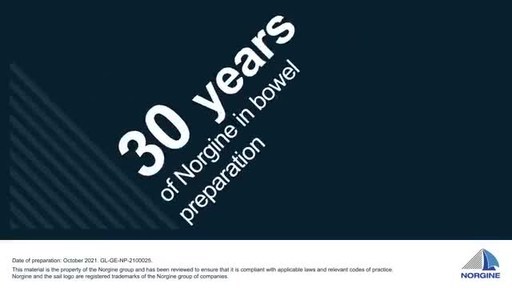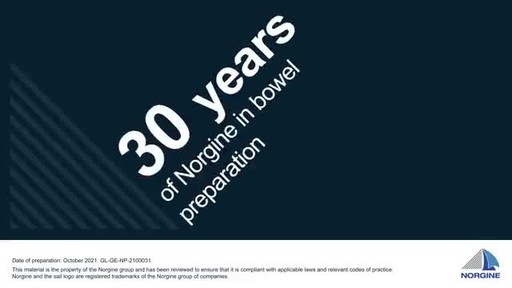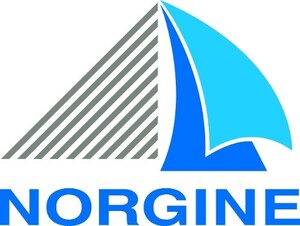AMSTERDAM, Oct. 5, 2021 /PRNewswire/ -- NORGINE B.V. (Norgine), a leading European specialist pharmaceutical company, celebrates its 30th anniversary of continuous innovation in bowel preparations at the United European Gastroenterology (UEG) Week Virtual. Bowel preparations are used in colonoscopy to prevent and diagnose serious gastrointestinal diseases, including colorectal cancer (CRC).
To view the Multimedia News Release, please click:
https://www.multivu.com/players/uk/8964451-norgine-celebrates-30-years-of-the-bowel-preparations-used-in-colonoscopy/
Colonoscopy for CRC screening has significantly reduced CRC incidence and mortality and improved prognosis.[1] Compared with no endoscopic screening, receipt of a screening colonoscopy was associated with a 67% reduction in the risk of death from any colorectal cancer.[2] Norgine launched its first bowel preparation 30 years ago and has continued to invest and innovate in this disease area to enhance both the patient experience of colonoscopy and the efficacy of the procedure.
Prof. Helmut Neumann, Professor of Medicine and Director of Endoscopy at the Department of Internal Medicine at the University Medical Center Mainz in Germany commented, "Colonoscopy is a potentially life-saving procedure for many patients. In the last decades we have seen advances that enable this important technique to improve detecting colorectal lesions. An effective bowel preparation is vital for a successful colorectal screening that can potentially help to save lives."
Dr. Luc Colemont, Gastroenterologist and Managing Director of Stop Darmkanker also commented, "Colonoscopy plays a critical role in the prevention and diagnosis of gastrointestinal diseases, including colorectal cancer. High-quality bowel preparation is integral to optimal CRC screening by colonoscopy. Over the last 30 years, patients and their healthcare professionals have gained more options for bowel preparation, with enhanced tolerability and cleansing quality."
Christopher Bath, Chief Operating Officer of Norgine added, "Optimal bowel preparation and high-quality endoscopic techniques facilitate early colorectal cancer detection. We are proud of the contribution we make to supporting patients undergoing colonoscopies and we are looking forward to continuing to do so for many years to come."
In the 50 years since the first colonoscopy, the procedure has become a crucial tool in the prevention and detection of gastrointestinal disorders, including colorectal cancer. Despite significant advances, however, the variation in uptake across Europe continues to prevent the potential of colonoscopy being fully realised for patients and health systems. Covid-19 pandemic has impacted colonoscopy services and imposed a backlog of postponed colonoscopy examinations. Strategies to maximise quality, reduce repeat procedures, improve patient experience while reducing risk of infection to the endoscopy team, and ensure sufficient capacity are required. [3]
When colorectal cancer is found at an early stage before it has spread, the 5-year relative survival rate is about 90%.[4] Enhancing people's understanding of the symptoms is therefore also important in supporting early detention. Symptoms can include bleeding from one's bottom and/or blood in faeces, a persistent and unexplained change in bowel habits, unexplained weight loss, extreme tiredness for no obvious reason and a pain or lump in the tummy. [5] Most people with these symptoms do not have bowel cancer, [6] however if someone experiences one or more of them, they should visit their doctor.
Follow us @norgine
Notes to Editors:
About colorectal cancer (CRC) and colonoscopy
Colorectal cancer is the second most common cause of cancer-related mortality world-wide.[7] Colorectal cancer is largely preventable, with early detection being associated with a 90% 5-year survival rate.[8] Colonoscopy is an effective method for colorectal cancer screening and has been shown to reduce both the incidence and mortality of colorectal cancer when applied in the general population. Inadequate pre-colonoscopy bowel cleansing reduces the diagnostic accuracy of colonoscopy, particularly for the detection of smaller lesions and sessile (slightly flattened) polyps. This may result in repeated procedures, thereby potentially increasing patient burden, resource requirement and costs and can possibly delay the initiation of treatment.[9],[10],[11]
About Norgine
Norgine is a leading European specialist pharmaceutical company that has been bringing transformative medicines to patients for over a century. Our commitment to transforming people's lives drives everything we do and our European experience, fully integrated infrastructure and exceptional partnership approach enables us to quickly apply creative solutions to bring life-changing medicines to patients that they may not otherwise be able to access. Norgine is proud to have helped 22 million patients around the world in 2020 and generated €448 million in net product sales, a growth of 7% over 2019.
Norgine has a direct presence in 12 European countries, as well as Australia and New Zealand. We also have a strong global network of partnerships in non-Norgine markets. We are a flexible and fully integrated pharmaceutical business, with manufacturing (Hengoed, Wales and Dreux, France), third party supply networks and significant product development capabilities, in addition to our sales and marketing infrastructure. This enables us to acquire, develop and commercialise specialist and innovative products that make a real difference to the lives of patients around the world.
In 2012, Norgine established Norgine Ventures, a complementary business which supports innovative healthcare companies through the provision of debt-like financing in Europe and the US. For more information, please visit www.norgineventures.com
NORGINE and the sail logo are trademarks of the Norgine group of companies.
References
[1] Sharma P, Burke CA, Johnson DA, Cash BD. The importance of colonoscopy bowel preparation for the detection of colorectal lesions and colorectal cancer prevention. Endosc Int Open. 2020;8(5):E673-E683. doi:10.1055/a-1127-3144
[2] Doubeni CA, Corley DA, Quinn VP, et al. Effectiveness of screening colonoscopy in reducing the risk of death from right and left colon cancer: a large community-based study. Gut 2018;67:291-298.
[3] Cadoni S, Ishaq S, Hassan C, et al. Covid-19 pandemic impact on colonoscopy service and suggestions for managing recovery. Endosc Int Open. 2020;8(7):E985-E989. doi:10.1055/a-1196-1711
[4] American Cancer Society. Survival Rates for Colorectal Cancer https://www.cancer.org/cancer/colon-rectal-cancer/detection-diagnosis-staging/survival-rates.html
[5] Keane MG, Johnson GJ. Early diagnosis improves survival in colorectal cancer. Practitioner. 2012 Jul-Aug;256(1753):15-8, 2. PMID: 22988701.
[6] Overview – Bowel Cancer, NHS https://www.nhs.uk/conditions/bowel-cancer/
[7] World Health Organisation. Cancer Fact Sheet https://www.who.int/news-room/fact-sheets/detail/cancer
[8] American Cancer Society. Can Colorectal Polyps and Cancer Found Early? https://www.cancer.org/cancer/colon-rectal-cancer/detection-diagnosis-staging/detection.html
[9] Bechtold ML, Mir F, Puli SR et al. Optimizing bowel preparation for colonoscopy: a guide to enhance quality of visualization. Ann Gastroenterol 2016; 29: 137 – 146
[10] Brenner H, Stock C, Hoffmeister M. Effect of screening sigmoidoscopy and screening colonoscopy on colorectal cancer incidence and mortality: systematic review and meta-analysis of randomised controlled trials and observational studies. BMJ 2014; 348: g2467
[11] Baxter NN, Warren JL, Barrett MJ et al. Association between colonoscopy and colorectal cancer mortality in a US cohort according to site of cancer and colonoscopist specialty. J Clin Oncol 2012; 30: 2664 – 2669
Logo - http://mma.prnewswire.com/media/597589/Norgine_Logo.jpg
Video - https://mma.prnewswire.com/media/1652832/Norgine_Prof_Helmut_Neumann.mp4
Video - https://mma.prnewswire.com/media/1652833/Norgine_Dr_Luc_Colemont.mp4









Share this article